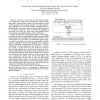Free Online Productivity Tools
i2Speak
i2Symbol
i2OCR
iTex2Img
iWeb2Print
iWeb2Shot
i2Type
iPdf2Split
iPdf2Merge
i2Bopomofo
i2Arabic
i2Style
i2Image
i2PDF
iLatex2Rtf
Sci2ools
136
click to vote
FDTC
2009
Springer
2009
Springer
KeeLoq and Side-Channel Analysis-Evolution of an Attack
—Last year we were able to break KeeLoq, which is a 64 bit block cipher that is popular for remote keyless entry (RKE) systems. KeeLoq RKEs are widely used for access control purposes such as garage openers or car door systems. Even though the attack seems almost straightforward in hindsight, there where many practical and theoretical problems to overcome. In this talk I want to describe the evolution of the attack over about two years. Also, some possible future improvements using fault-injection will be mentioned. During the first phase of breaking KeeLoq, a surprisingly long time was spent on analyzing the target hardware, taking measurements and wondering why we did not succeed. In the second phase, we were able to use differential power analysis attacks successfully on numerous commercially available products employing KeeLoq code hopping. Our techniques allow for efficiently revealing both the secret key of a remote transmitter and the manufacturer key stored in a receiver. A...
| Added | 26 May 2010 |
| Updated | 26 May 2010 |
| Type | Conference |
| Year | 2009 |
| Where | FDTC |
| Authors | Christof Paar, Thomas Eisenbarth, Markus Kasper, Timo Kasper, Amir Moradi |
Comments (0)

